This article was originally posted on Medium.
When Y Combinator dropped their top 100 companies as of 2019, I was curious — how many companies have female presenting people as founders? This question lead me to dig further and gather more and more information about these companies. I wanted to share these statistics I found with you!

It has been said that it is more competitive to get accepted to Y Combinator than it is to get into schools like Harvard and MIT. YC boasts an acceptance rate of 1.5% in 2015. Since their Winter 2015 batch, they’ve shared statistics about the relevant batch, as well as about their previous investments — you can read them here.
Methods 🔗
The information gathered to create these observations were found using my Crunchbase Pro account, as well as the information found using LinkedIn. The list actually includes 102 companies, however information about two companies (Quero Education and Newfront) were not available on Crunchbase. They will not be included in the results — information about the founders of these companies as well as the information provided from the YC list will be included. All information found is accurate as of October 6th.
There were discrepancies found between what is listed on the Y Combinator list and what is included on the Crunchbase profile of some companies (and in some cases, a discrepancy between what is listed on the Y Combinator list and what is mentioned on specific people’s LinkedIn accounts). The information presented on the Y Combinator list was taken to be the most accurate and therefore, all discrepancies from this list were ignored.
In regards to the Education analysis portion, a dropout of any kind was counted as a dropout, and the school and education level recorded is respective to the persons highest received level of education.
Results 🔗
About the Founders 🔗
A total of 241 founders are credited on the YC list. Only two people on this list are repeat founders — Justin Kan (Twitch + Atrium) and Kyle Vogt (Twitch + Cruise).
There are an average of 2.3 founders per company, with the most common number of founders being 2 (as expected). Breaking down the list more, 13 companies have only one founder, and on the other side of the spectrum, the maximum number of founders for a company is 7.
Answering the question that sparked this all: only 9 of the 239 founders are female presenting. In other words, 3.8% of the founders are women. Looking exclusively at the top 50 companies, there are only 2 female presenting founders — in the top 10, only 1.
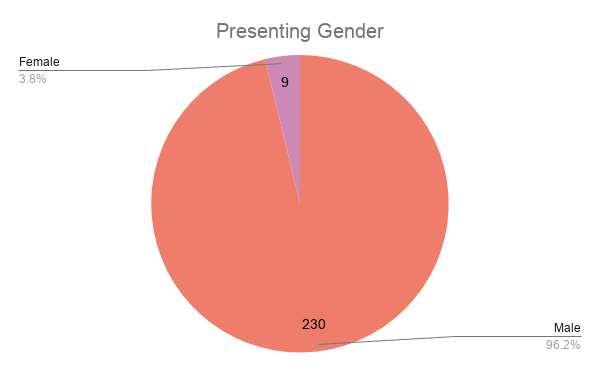
The most common name of a founder was Brandon. While there were only 9 females credited on the list, there were 7 Brandons credited as well. If you care, the top 10 most commons names are:
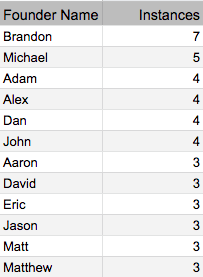
Founder Education 🔗
There’s a shift in attitude toward “higher” education — however that does not discredit the educational pursuits of these founders. Information about any form of education and their highest degree level was unavailable for 11 founders — their information will not be included in the results.
The 228 founders represent a spread across 96 unique universities. The most common school seen on the list was MIT — alma matter of the first founder listed on the YC list, Patrick Collison, even though he did drop out. Of the 96 unique universities, 57 universities only had one founder attend.
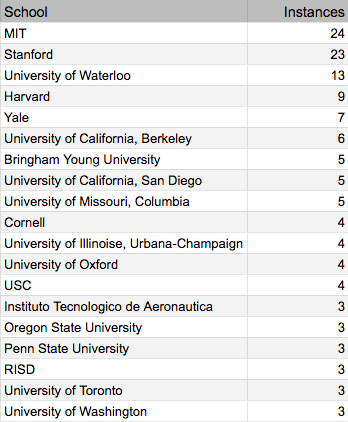
Only 11 founders dropped out of education — including 2 dropping out of PhD programs and one dropping out of a master’s degree. One hundred and thirty founders have a bachelors degree or equivalent, but there is only one MD and two lawyers. A total of 23 founders do not list their level of education.
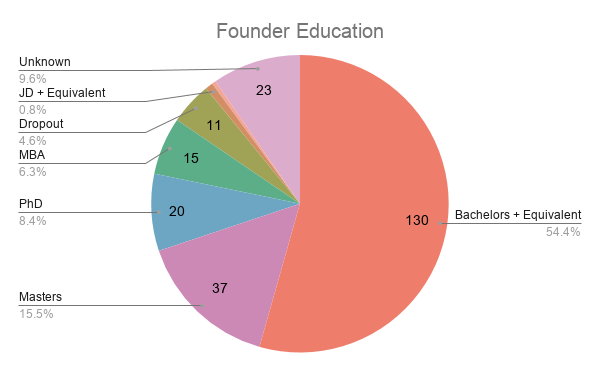
About the Investors 🔗
A total of 2117 unique term sheets have been signed for YC companies coming from 1090 unique investors and investor groups across 554 unique investment rounds. Of these unique investment groups, only 323 groups have made multiple investments (leaving 766 entities making one off investments). Breaking this number down further, only 17 groups have invested more than 10 times.
On Crunchbase, only one company does not list YC as an investor. Excluding this, of course, the most common investor is Y Combinator. Excluding YC from the results, the most frequent investor in YC companies is SV Angels, making a total of 42 unique investments. The most frequent solo investor is one of YC’s own managing partners — Paul Buchheit, tied for third place with 22 unique investments.
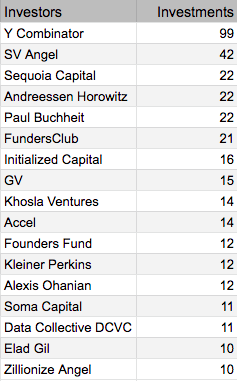
The top 100 companies are credited with raising a whopping total of $30,168,757,335 with an average of 21.2 investors per company across an average of 5.54 rounds. On the high end, Gusto has taken investments from 103 groups, and while ZeroDown only has 1 investor credited.
About the Companies 🔗
Together, all 102 companies are credited with creating 54,434 jobs and acquiring 12 companies across 12 unique sectors.
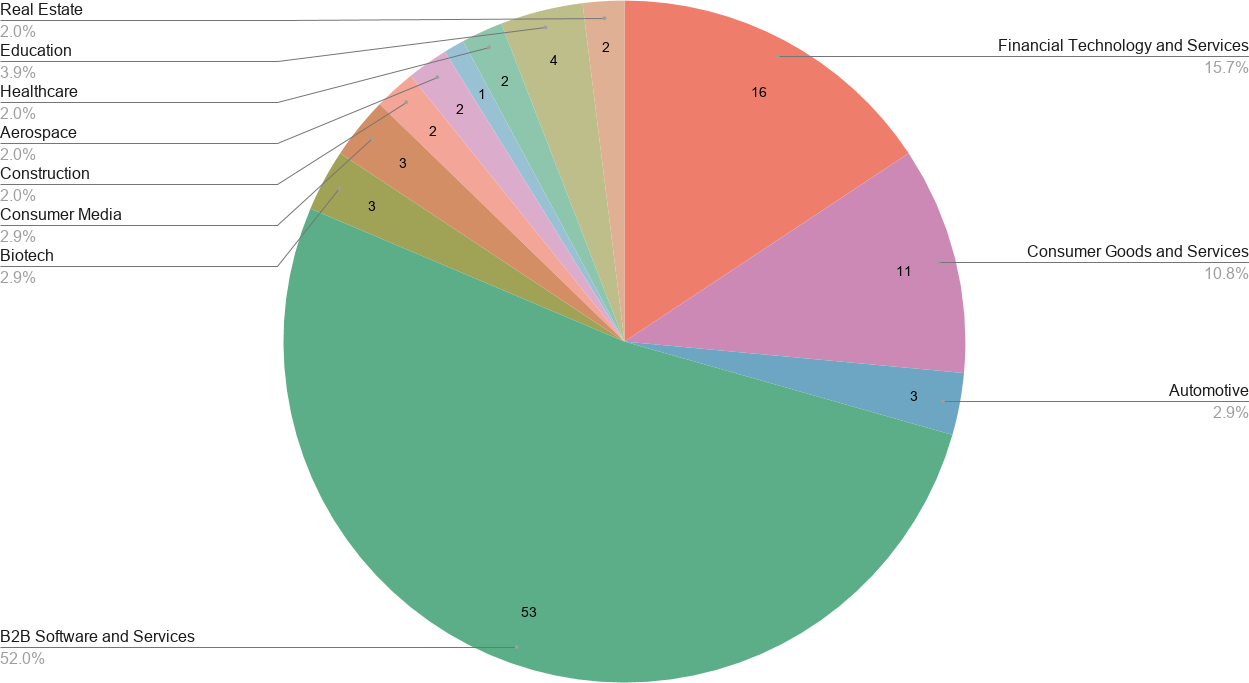
Easily, you can see YC companies lean toward the B2B Sector (53 companies), with the least represented being Energy and Environment (1 company).
Sixty five companies call San Francisco, CA home — including all 4 companies that list their headquarters in multiple locations — with a total of 75 being located in some capacity in the Bay Area. In contrast, four companies are listed as completely remote.

Looking for a company outside the Bay Area?
The average batch is Summer 2013, but the most common batch is Summer 2016. The average age of each company, however, is 6.4 years old. The spread of ages consists of the oldest being Scribd (fourteen years old, 2005), and both Grin and ZeroDown as the youngest (one year old, 2018).
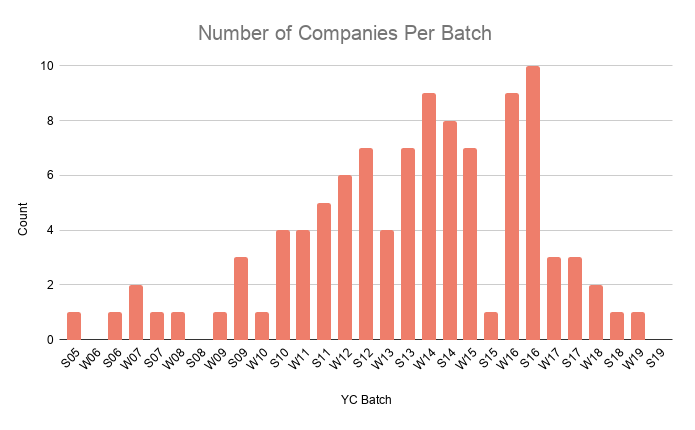
Only 2 companies have IPO’d — Dropbox and Pagerduty. On the other hand, 11 companies have been acquired for a minimum total of $4,632,000,000. I was only able to find valuations for 32 of the 102 companies, and therefore is not representative of the dataset. We can assume, however, the valuations can range anywhere from just north of $35,000,000,000 (Stripe) to $150,000,000 (Lambda School).
What does this all mean? 🔗
First, this list is not comprehensive of all of YC’s investment. To make the YC top 100 companies, you had to have a valuation of “$150 MILLION+” yet companies with known high valuations like Zenefits, 9GAG, and Machine Zone are not on this list. Why the lack of inclusion? Unknown. Maybe it was an opt-in survey, and the higher ups decided to pass on indulging the information. Maybe they decided to opt-out of the potential publicity. Who knows.
What can we glimpse from this data? We can “assume” the tendencies of the most common traits that YC invests in: a guy named Brandon who graduated from MIT with a bachelors degree, and is working on a B2B startup headquartered in San Francisco with a cofounder.
But really, it doesn’t mean anything. One thing we do know for certain is that there is no type of stereotypical founder. YC isn’t looking to only invest in one specific kind of person. Successful companies come from founders of all ages, backgrounds, locations, and (soon to be) genders (support more female founders!). There are companies, locations, and schools that can be seen to tend toward “success” however you cannot let this information cause limits to your founder experience. Successful companies can be started anywhere, raise money from anyone, have founders from any background, and can be in any field.
![[75 companies are in San Francisco]](/2019-11/7-location.png)